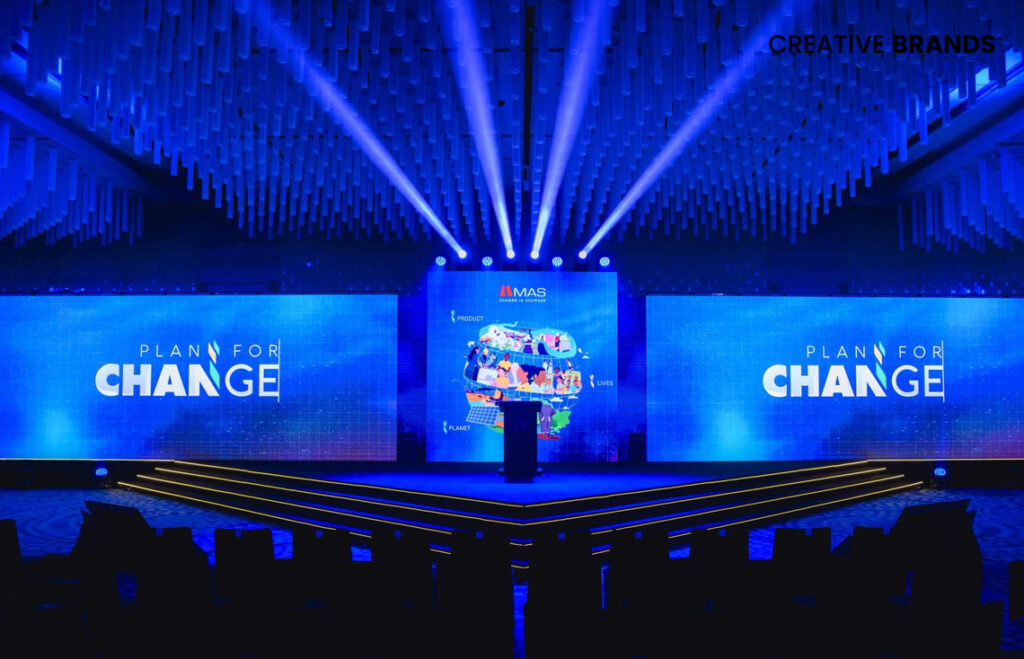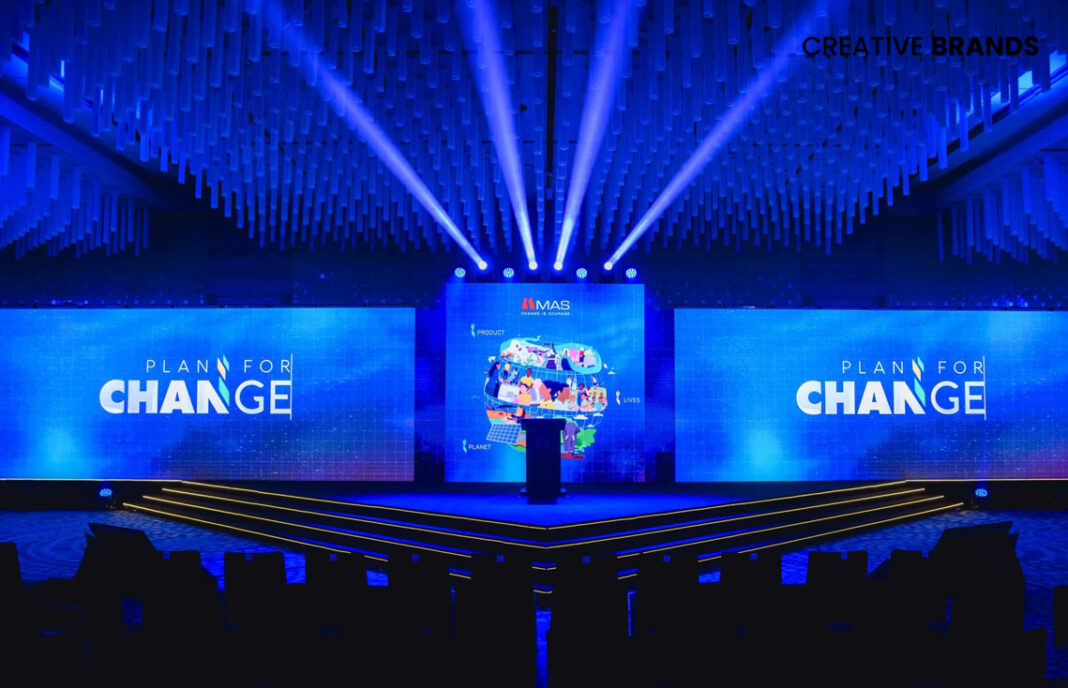MAS Holdings has launched its renewed sustainability strategy, Plan for Change 2030, bringing global changemakers together to discuss innovation, accountability and collaboration in driving industry-wide transformation. As one of Asia’s leading apparel manufacturers, MAS reaffirmed its commitment to climate action, circularity, community impact and resilient growth for the future of global apparel.

MAS Holdings has set a renewed tone for the global apparel sector’s sustainability agenda with the launch of its updated long-term strategy, MAS Plan for Change 2030—an ambitious framework that reaffirms the company’s commitment to responsible manufacturing, climate resilience, and a future where innovation and accountability shape every part of the value chain. The launch event, which brought together leading voices from across industries and sustainability domains, served not just as a platform to introduce the refined roadmap but also as a forum for open dialogue on the urgent challenges facing global supply chains.
The choice to spotlight collaboration was deliberate. Over the past decade, the apparel industry has been grappling with mounting environmental expectations, shifting consumer behaviour, geopolitical disruptions, and increasingly complex global regulations. The discussions at the MAS gathering reflected these realities with nuance, emphasising that meaningful sustainability progress cannot occur in silos. Experts from diverse sectors underscored the need for shared standards, cross-industry innovation, and transparent models that ensure equitable benefits for workers, communities, and businesses. MAS positioned the event as a catalyst—an opportunity not only to state its commitments but to inspire a collective shift among global manufacturers.
For MAS Holdings, sustainability is neither new nor an add-on. It is a part of the company’s DNA—a philosophy that has evolved since its founding but remains deeply rooted in responsible business. Established as an innovation-driven enterprise that blends bold thinking with a vision for long-term impact, MAS has grown into one of Asia’s most respected apparel and textile manufacturers. Today, it stands as a leader in intimate apparel, sportswear, performance wear, and swimwear manufacturing, while also offering advanced IT solutions to the global apparel and footwear sectors. With a workforce of over 114,000 associates worldwide, MAS’s identity is built not only on its manufacturing excellence but on a commitment to community wellbeing and people-focused growth.
This underlying ethos shaped the refreshed MAS Plan for Change 2030. The strategy aims to accelerate the company’s sustainability ambitions, addressing climate action, circularity, biodiversity protection, social equity, worker empowerment, and product innovation. While the details of the plan encompass multiple targets and multi-year benchmarks, the core message delivered at the event was clear: sustainability is a responsibility that must be embedded into every business decision, every partnership, and every facility under the MAS umbrella.
The conversations held during the event frequently returned to the theme of resilience. Industry leaders examined how global apparel supply chains have faced disruptions brought on by climate volatility, economic uncertainty, and evolving regulatory demands. Speakers stressed that resilience cannot be achieved by merely reacting to challenges—it must be built through foresight, investments in clean technology, and the adoption of agile systems that ensure continuity while reducing environmental impact. MAS leaders echoed this sentiment, noting that the company’s future-readiness depends on integrating innovation into sustainability, rather than treating the two as separate tracks.
Innovation, in fact, has long been one of MAS’s defining strengths, and it emerged as one of the pillars of the discussions. Participants highlighted that the next phase of sustainability in apparel requires creative breakthroughs, from eco-efficient materials and dyeing technologies to smarter supply chain analytics and data-driven transparency solutions. As a company that has championed advanced manufacturing practices for years, MAS expressed confidence that innovation will remain central to achieving the goals outlined in the Plan for Change 2030. The company reiterated its belief that embracing emerging technologies—ranging from AI-driven production to renewable energy systems—will allow manufacturers to reduce their environmental footprint while enhancing product quality and competitiveness.
But innovation alone is not enough. Another theme that resonated throughout the event was accountability. Sustainability, the speakers agreed, demands measurable progress and openness. Companies must demonstrate responsibility not only to their shareholders but to their workers, consumers, and the communities that host their operations. MAS leaders noted that the company’s renewed framework includes transparent monitoring systems, reporting mechanisms, and clear metrics linked to each major sustainability pillar. By establishing this foundation, MAS aims to build trust and ensure that its commitments translate into meaningful action.
The discussion also reflected a broader shift happening within the global apparel sector—a move toward sustainability as a central driver of business strategy rather than a peripheral concern. Several changemakers at the event highlighted how consumers, investors, and regulatory bodies are holding brands and manufacturers to higher standards. As sustainability becomes a core business expectation, companies that proactively adapt are likely to lead the next decade of industry transformation. MAS’s Plan for Change 2030 represents an acknowledgement of this shift, positioning the company as a leader ready to navigate future demands while inspiring others in the ecosystem to do the same.
The emphasis on collaboration extended beyond industry boundaries. Experts spoke about the importance of linking academia, technology innovators, government leaders, and community organisations to accelerate progress. They noted that challenges such as decarbonisation, water conservation, and circularity require diverse expertise and shared learning. MAS used the platform to reaffirm its role as a convenor, emphasising its willingness to work with partners across sectors to amplify impact. The event’s collaborative spirit signalled a growing recognition that the sustainability challenges facing the world are systemic—and therefore require collective solutions.
At the heart of the conversations were the people who drive MAS forward: its 114,000 associates worldwide. The Plan for Change 2030 places significant focus on human development, worker well-being, and community empowerment. Discussions around inclusive growth highlighted the importance of nurturing talent, ensuring fair and safe work environments, and investing in the development of future-ready skills. MAS representatives emphasised that the company’s identity extends beyond manufacturing excellence; it is grounded in building thriving communities and empowering individuals to achieve their full potential.
The launch of MAS Plan for Change 2030 arrives at a moment when the apparel industry faces both immense pressure and unprecedented opportunity. As sustainability expectations reach new heights, manufacturers must navigate a landscape shaped by innovation, collaboration, and shifting consumer consciousness. MAS’s renewed strategy positions the company not merely to adapt but to shape the industry’s evolution. By setting ambitious goals and engaging the global community in meaningful dialogue, MAS signals its intention to remain at the forefront of sustainable transformation.
The launch event ultimately reinforced that the future of apparel manufacturing will be defined by those willing to lead with purpose, think boldly, and work collectively. For MAS Holdings, the Plan for Change 2030 is more than a roadmap—it is a commitment to accelerate the transition toward a more sustainable, equitable, and resilient world. The company’s legacy of visionary thinking continues to guide its path forward, shaping an industry that must balance creativity with responsibility, and growth with the well-being of people and the planet.
As the conversations concluded, one message stood clear: sustainability is a journey without a finish line. With its renewed strategy and focus on lasting impact, MAS Holdings has signalled its readiness to lead that journey, redefining what the next decade of apparel manufacturing can—and must—look like.
Discover more from Creative Brands
Subscribe to get the latest posts sent to your email.






